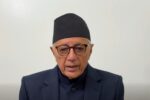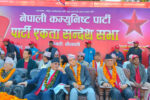The KP Oli-led government has missed out from its prioritization in the last one year at the expense of the general public. The arrogant government merely pretended to have performed at the fullest. In fact, it has nothing to celebrate in its one-year rule. The government’s behavior is nothing but arrogant. This means that the government has failed to speak about the poor, who are suffering due to the skyrocketing market prices.
To be precise, the government’s one year in office has been a total failure on all fronts. The Oli-led government simply engaged in the dumping of dirt into the sea by running against the spirit of the law. The agrarian distress has been quite visible and the discontentment is spilling over.
People have not felt the presence of the government. For instance, the ruling party’s guerilla-style approach in the parliament surrounding the case of Dr. Govinda KC is a glaring example of the height of its imperiousness. There are quite a lot of examples that validate the government’s ineptitude coupled with arrogance, impunity, and domineering conduct. In short, the government has been a book of moral bankruptcy.
What did it do then? Prime Minister Oli engaged in dispensing boastful claims about development and its achievements. Its priorities have been nonsensical since it snubbed constitutional supremacy in the name of parliamentary supremacy.
What’s even more worrying is that the Nepal Communist Party (NCP) government failed on the economic front with a sliding growth rate.
People have not felt the presence of the government. For instance, the ruling party’s guerilla-style approach in the parliament surrounding the case of Dr. Govinda KC is a glaring example of the height of its imperiousness. There are quite a lot of examples that validate the government’s ineptitude coupled with arrogance, impunity, and domineering conduct. In short, the government has been a book of moral bankruptcy.
Institutionalized corruption
The government seems to be hell-bent on institutionalizing corruption in the country. The cabinet decided to award the contract for developing the Budhi Gandaki Hydropower Project to a Chinese company without free competition. Another example is the about the report of the parliamentary Public Accounts Committee (PAC) sub-committee, which has categorically mentioned about the embezzlement in the procurement of the wide-body aircraft.
The constitution guides the parliament. However, the NCP — having a two-thirds majority — has been pitching their voice on parliamentary supremacy. Forming a judicial committee by challenging the report of the parliamentary sub-committee is a breach of the constitution and an insult of the sovereign parliament.
The sub-committee submitted its report to the PAC recommending action against some ministers, who had been implicated in the scam. However, the government insulted the sovereign parliament by disregarding the report and forming a judicial committee to look into the issue.
The lawmakers of the ruling party and the government ministers are cautiously mindful about not pronouncing the phrase ‘constitutional supremacy’. This term means that a country’s constitution is supreme over the parliament and that the parliament can exercise its function being only within the parameters of the constitution. Unfortunately, the government has been reiterating the phrase ‘parliamentary supremacy’ conceitedly.
The constitution guides the parliament. However, the NCP — having a two-thirds majority — has been pitching their voice on parliamentary supremacy. Forming a judicial committee by challenging the report of the parliamentary sub-committee is a breach of the constitution and an insult of the sovereign parliament.
Here, let me cite an example. The case surrounding the Lauda scam too faced a similar situation before. Incumbent Foreign Minister Pradeep Gyawali, who was then a member of the Public Accounts Committee, was entrusted to lead the sub-committee formed to investigate into the scam. The PAC endorsed the report prepared by the sub-committee and sent it to the Commission for the Investment of Abuse of Authority (CIAA) for further action. Unfortunately, the government of Gyawali’s party now has endeavored to settle the issue by forming a judicial committee. The government should have the guts to bring the guilty to book under any circumstances.
Immature foreign policy
The statement issued by Chairman of the ruling NCP Pushpa Kamal Dahal on Venezuela political crisis has dragged Nepal into controversy in the global political spectrum. This justifies that the communists often express their views at the behest of some other power, no matter how democratic they pretend to be. Isn’t this a height of immaturity? The relationship between Nepal and the United States of America soured following Dahal’s statement. Nepali Ambassador to America was summoned to the State Department while the US Ambassador to Nepal boycotted the luncheon meeting organized by Prime Minister KP Oli. This is a glaring example of a failed foreign policy.
Several power nations, including our close neighbors India and China, were seriously concerned over Nepal’s statement on the issue at a time when PM Oli has been reiterating that Nepal’s relation with immediate neighbors has been taken to a new height. In reality, even our southern neighbor is worried about Nepal for tilting towards China.
There are several issues and commitments that Nepal needs to sort out with India and China. We all have to understand that if we lose faith in diplomacy, the country will fall in jeopardy. Nepal has been the focus of all the international powers due to its geopolitical situation.
The government has to take help from the Nepali Congress on the issue of geopolitics. America is showing its interest in Tibet and the Indo-Pacific Region. Nepal has already been involved in it following the foreign minister’s visit to America.
Lack of dialogue with the opposition
There is a lack of dialogue between the government and the opposition. The government has to hold talks with the main opposition when it comes to crucial issues. The majority does not apply everywhere. No government retains the right to move ahead by breaching the system. It is not acceptable. The opposition has to strongly voice against such issues.
Weak civil society
The civil society, which had played an instrumental role in establishing democracy in the country, is a mute spectator on this issue, these days. If the government carried out its activities in the same manner and the opposition kept mum, the country will fall into a big crisis.
Conclusion
The ruling party leaders have already abandoned the principles of democracy and separation of powers. The Executive, Legislative and Judiciary are different entities with their own duties, responsibilities, and jurisdiction. It is necessary to maintain a balance between these three bodies. Currently, there is no balance between these three entities.
It indicates that the country is heading towards the destination of a totalitarian and authoritarian regime. We don’t see the speed, efficiency, and skills as should have been in the two-thirds majority government led by PM Oli. By and large, the government has failed in many aspects.
(Dr. Shekhar Koirala is a central working committee member of the Nepali Congress)









Comment